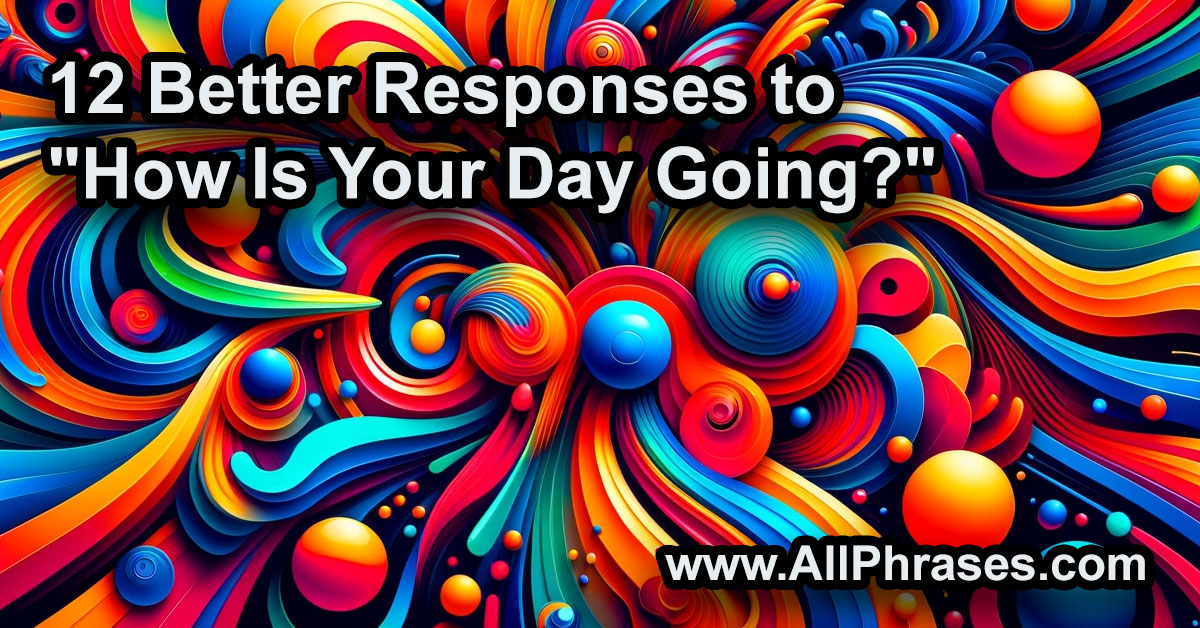Ever been asked, ‘How is your day going?’ and found yourself replying with the same old ‘Good, thanks’ or ‘Not bad’?
It’s time to shake up your responses and add a little spark to your everyday conversations!
In our fast-paced world, where small talk is often reduced to routine exchanges, bringing creativity to your replies can not only make your interactions more engaging but also reflect more accurately how you’re really feeling.
Whether you’re having a fantastic day or just muddling through, our list of 12 dynamic responses will help you express yourself more vividly.
12 Alternative Replies to “How Is Your Day Going?”
- “It’s been a rollercoaster, but I’m enjoying the ride!”
- “Surprisingly productive – I’ve ticked almost everything off my to-do list.”
- “Actually, it’s been quite an adventure. Let me tell you about it…”
- “It’s a ‘need more coffee’ kind of day, but I’m managing.”
- “Better now that I’m talking to you!”
- “Like a page-turner of a book; full of surprises.”
- “It’s been peaceful, like a quiet morning by the sea.”
- “A mix of sunshine and a little rain, but that’s life, right?”
- “I’ve had a burst of creativity today, which is exciting.”
- “Feeling productive! It’s one of those days where everything just flows.”
- “A bit challenging, but I’m learning a lot along the way.”
- “It’s a day of reflection and gratitude for me.”
Why Do People Say, “How Is Your Day Going?”
The question “How is your day going?” is a common conversational opener, serving multiple purposes in social interactions:
- Social Norm and Politeness: It’s a standard, polite greeting in many cultures. Asking about someone’s day is a way of showing interest in their well-being, a basic form of courtesy in everyday interactions.
- Initiating Conversation: The question serves as an easy conversation starter. It’s open-ended enough to allow for a variety of responses, but specific enough to show that the asker is interested in the respondent’s personal experience.
- Building Connection: By inquiring about someone’s day, people express a willingness to connect on a personal level. It can be a way of deepening a relationship, showing that you care about what happens in their life.
- Checking In: For friends, family, or close colleagues, this question can be a genuine check-in to see how the other person is doing, especially if there’s an awareness of recent events (good or bad) in that person’s life.
- Gauging Mood and Context: It’s also a way to gauge someone’s mood or the context of their day, which can be useful information in both personal and professional settings. The response can set the tone for the subsequent interaction.
- Filling Social Space: Sometimes, it’s simply used to fill a silence or provide a non-controversial topic of conversation, particularly in situations where people are still getting to know each other or in passing encounters.
Overall, “How is your day going?” is a socially accepted way to engage with others, signaling openness to conversation and a basic level of interest in the other person’s life. It’s a small but important building block in the foundation of everyday social interactions.
What to Say If Your Day Isn’t Going Well
Responding truthfully to “How is your day going?” when you’re having a bad day, while still maintaining social appropriateness, can be a delicate balance.
Here are some ways to respond:
- Simple Honesty: “It’s been a bit challenging, but I’m managing. Thanks for asking.”
- Focus on Learning: “It’s been a tough day, but I’m learning a lot from these challenges.”
- Express Optimism: “Not the best day, but I’m hopeful it’ll get better.”
- Be Vague but Honest: “It’s one of those days, you know? Just trying to keep going.”
- Share a Bit (If Comfortable): “I’ve had better days – dealing with [a specific issue], but hanging in there.”
- Use Humor (If Appropriate): “Surviving, not thriving! But that’s life sometimes, right?”
- Redirect the Conversation: “It’s been a rough one, but I’m more interested in hearing about your day.”
- Express Gratitude: “It’s been a hard day, but I’m grateful for the support of friends/family/colleagues.”
- Combine Honesty with Positivity: “Today’s been tough, but I’ve had some good moments too.”
- Acknowledge and Pivot: “It’s not my best day, but I’m trying to focus on the positives.”
These responses allow you to be honest about your day without dwelling on the negatives or oversharing, especially in professional or casual social settings. They also open up opportunities for support or changing the subject gracefully.

